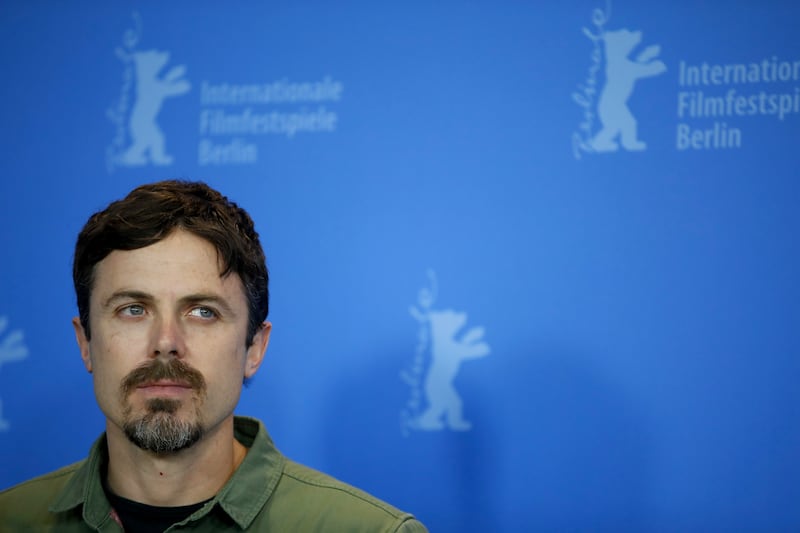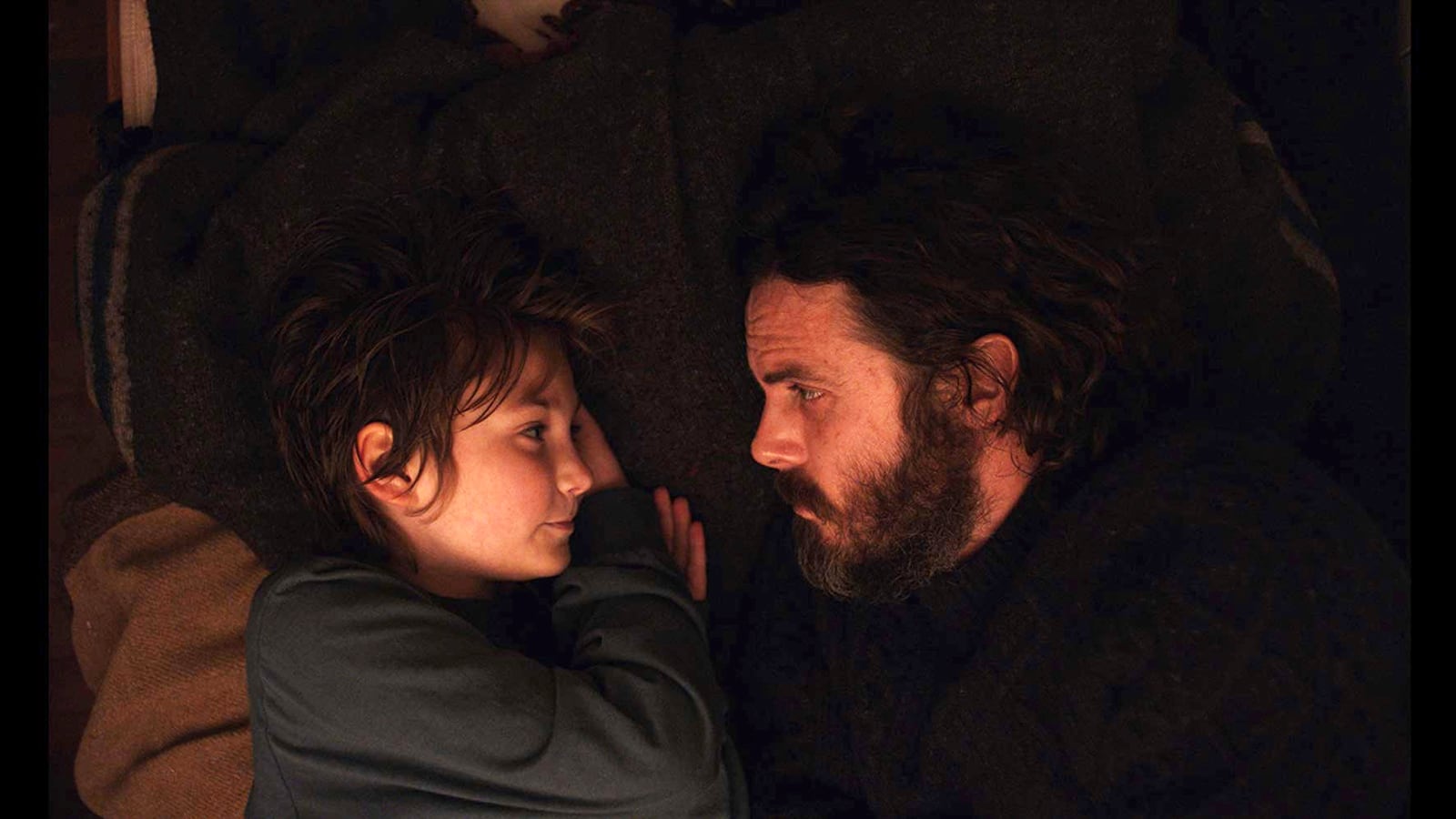A critically acclaimed actor with the added advantage of powerful Hollywood connections is accused of sexual harassment by two female colleagues on the set of his passion project. He then goes on to write, direct and star in a film about a world in which women are essentially extinct. This might sound like a joke or a promising film parody—but like everything Casey Affleck, male auteur, takes on, it’s dead serious. And hilariously enough the project, Light of My Life, is premiering on the heels of brother Ben’s latest industry announcement: an upcoming film about two men fighting over a woman’s heavily questioned rape allegation.
Casey Affleck was accused of sexual harassment by a producer and a cinematographer who he worked with on the 2010 documentary I’m Still Here. Affleck has denied the claims repeatedly; both cases were eventually settled for undisclosed amounts. In legal documents, director of photography Magdalena Gorka described the treatment she received on Affleck’s set as “the most traumatizing of her career.”
“Almost immediately after beginning work on the project, the gross comments allegedly began. Gorka claimed Affleck and other members of the production team openly talked about engaging in sexual activities with her, and jokingly suggested that she have sex with the camera assistant, a good friend of Affleck’s,” The Daily Beast summarized in 2016. Gorka stated that she was subjected to “a nearly daily barrage of sexual comments, innuendo, and unwelcome advances by crew members, within the presence and with the active encouragement of Affleck.”
Gorka further claimed that, during a work trip to New York in December of 2008, she was woken up in the middle of the night by Affleck, “Curled up next to her in the bed wearing only his underwear and a T-shirt. He had his arm around her, was caressing her back, his face was within inches of hers and his breath reeked of alcohol.” She alleged that Affleck only got up after she repeatedly rejected her boss’s advances, and that he “left and slammed the door in anger.”
Amanda White, a producer on the film, alleged in her complaint that she was repeatedly harassed on set. This included an instance in which Affleck allegedly ordered a crew member to take off his pants and expose himself to White, and another instance in which Affleck allegedly asked White, “Isn’t it about time you get pregnant?”, before proposing that she and a male crew member reproduce.
As The Daily Beast reported, White also described an incident “where she was prevented from returning to her bedroom during shooting, because Affleck and [Joaquin Phoenix] had locked themselves in her room with two women where they had sex with them… She also alleged that Affleck attempted to manipulate her into sharing a hotel room with him. When she resisted, White claimed, he grabbed her threateningly and attempted to scare her into submission. Affleck then allegedly proceeded to send White abusive text messages, calling her ‘profane names’ for refusing to stay with him.”
So far, Affleck’s #MeToo reckoning has consisted of sitting out the 2018 Academy Awards—he ended up taking home the Best Actor Oscar that year despite widespread coverage of the allegations—and issuing an incredibly belated “apology” in which he copped to contributing to an “unprofessional environment.” In the same interview, Affleck went long on #MeToo, insisting that he was taking the wider cultural conversation to heart. “I kind of moved from a place of being defensive to one of a more mature point of view, trying to find my own culpability. And once I did that I discovered there was a lot to learn.”
It’s a classic case of one step forward, two steps back. It’s great that Affleck, who used to shrug off questions about the allegations, is finally starting to publicly reckon with Gorka and White’s claims. But the last thing we need is a tidal wave of “bad” men unleashing their #MeToo-inspired art into the world.
Already we’re drowning in the comebacks, redemptions, and mea culpas. Affleck’s latest offering is a whole different kind of nightmare: a Serious Film that reads as a total fuck you to anyone who’s familiar with the allegations against him. Light of My Life is the story of “Dad” (Casey Affleck), a man who’s struggling to protect his daughter in a world without women. Except the premise is a bit more complicated than it initially appears. We come to learn that “Rag” (Anna Pniowsky), is not actually the only woman around. There are others like her, who also survived a mysterious, gendered plague—or so we’re told. These women are only rumored. Men sneak glances at them and then pass these worn mental photographs around to the others: images of women confined in bunkers, stolen and kept by pillagers, attacked and killed by mobs of rapists. I wonder what appealed to Casey Affleck about a world in which women are essentially theoretical?
Naturally, people are already reacting to the plot of Light of My Life, which is both funny and offensive for a number of obvious reasons. Casey Affleck, a man whose career was affected (but, clearly, not derailed) by claims made by women, has written a movie in which he kills us all off. A man accused of creating a hostile environment for female colleagues has conceived of the most hostile environment imaginable, one in which most women physically cannot survive (and the few remaining are imprisoned, raped or slaughtered). A Hollywood A-lister who allegedly mistreats women on set cleverly designed himself a nearly women-free workplace. As The Cut explained, “In his new film, Affleck imagines a world where he is free of all the hassles that come with having to work with, respect, and generally exist alongside women, because all the women (except one) have been wiped out.”
But watch Light of My Life and you’ll see that Affleck has done something clever here (although probably not as clever as he thinks). As the writer and director of the film, he conceived of a dark and vile world where most women have been killed off by plague or by men, and where any surviving woman—and by extension, the audience—fears imminent sexual violence. It’s not sufficient to describe this as a world without women. It’s a world full of rapists, where just about every man who isn’t Rag’s father is a predator, scanning for girls and women and willing to take them by force.
Affleck’s assumption that a sharp decrease in the female population would lead to the immediate normalization of sexual violence and transform all men into predators probably says something about Casey Affleck. But the director is able to distance himself from all this ugliness by casting himself as one of the last living allies. As Rag’s father, he’s dedicated his entire life to protecting her. He’s also something of a feminist, warning his daughter about the prescriptive beauty standards in an old women’s magazine she scavenges and decrying a man who calls women “dolls.” He explains to Rag that while that might sound like a term of endearment, it’s actually a way to put women down by casting them as inanimate objects, not human beings. The irony, of course, is that the women in this film are even less than objects—they’re invisible, ideas, rhetorical devices. Other than Rag, who’s a young girl, the only other woman we see is Rag’s “Mom” (Elisabeth Moss), and only in Dad’s memories.
The world that Affleck has created is a hellish dystopia for women, but a perfect place to explore men’s rich complexities and untold depths. This is a film about how men relate to other men in the absence of women. At one point, Dad explains his own thoughts on the eradication of women, telling his daughter that women brought balance to the world; that in their absence men became lonely, which made them angry. Implied is that women’s main societal contribution was acting as some sort of temporary balm to toxic, violent masculinity. In a later scene, Dad is confronted by and then later bonds with a man who accuses him of having abducted Rag. The man identifies himself as a father of daughters, which assures Dad that he is not a threat to Rag. In this world, women are a flashback, a two-dimensional memory, a domesticating force. They’re a humanizing device that magically make men decent. Dad and his new friend aren’t like all the other men, because they have daughters. But we’ve heard that one before.

According to Light of My Life’s own logic Rag, which is literally short for Raggedy Ann, ought to be a doll figure herself. Her physical vulnerability powers the entire plot of the film—the escapes, the hideouts, the close calls. Her existence makes her father a better man, as the film charts his journey as an overprotective parent coming to terms with the needs and nascent independence of his child. But Rag graces the project like a vision from another, better film. Pniowsky’s stunning rendering culminates in a shocking reversal, as she steps into her father’s savior role. Light of My Life unearths some interesting themes, even if it’s unequipped to sufficiently grapple with them, and Affleck and Pniowsky are a powerful pairing. The young actress’s performance is no joke, but the Casey Affleck of it all ensures that the film will be treated as one.
In Affleck’s hands, this already questionable material is just too uncomfortable; and unfortunately for Pniowsky, Affleck’s hubris in writing, directing, and starring in a project like this one is all but certain to detract from her work. It’s yet another should-be jest, courtesy of our own dystopian reality: Casey Affleck made a film where he only had to cast two women, and he still managed to do them dirty.


